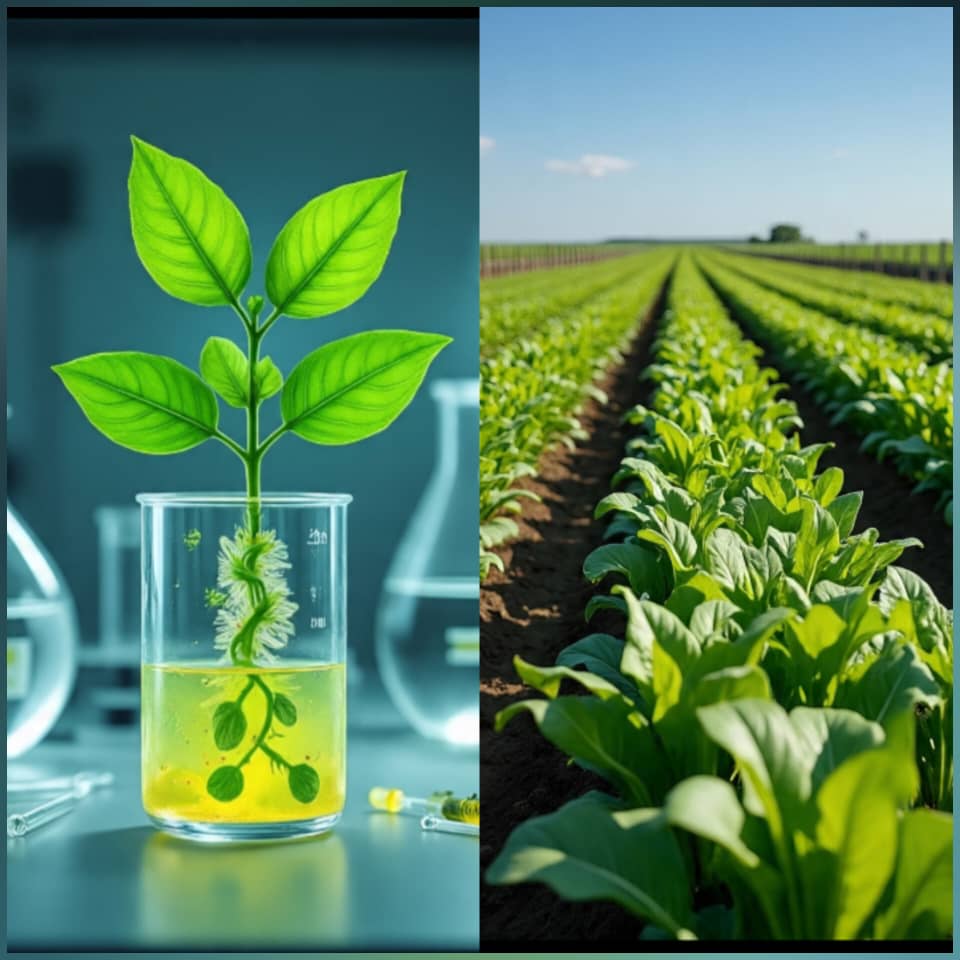Inside Nigeria’s GMO Uproar: Facts, Fears, and Twitter Firestorms

What Are GMOs?
Genetically Modified Organisms (GMOs) are plants or animals whose genes have been altered in a lab to introduce specific traits—such as drought resistance, pest deterrence, or enhanced nutritional content. In Nigeria, examples include Tela maize (drought- and pest-resistant) and Bt cowpea and cotton.
Benefits & Promises
Increased yields & food security: GMO crops like Tela maize and Bt cowpea can boost production and withstand pests and climate stress.
Enhanced nutrition: Biofortified crops (e.g., Vitamin A cassava) could help combat malnutrition.
Reduced pesticide use: Some GMO crops lower pesticide needs, reducing environmental impact.
Disadvantages & Risks
Health concerns: Debates continue over allergenicity, toxicity, and long-term health effects—potential links to cancer or endocrine disruption remain under scrutiny.
Environmental damage: Risks include gene transfer to wild plants, creation of “superweeds,” biodiversity loss, and soil degradation.
Loss of seed sovereignty: Critics warn smallholder farmers may become reliant on patented seeds from multinationals, undermining local seed systems.
Long-Term Effects & Regulation
Experts call for comprehensive, independent national studies to evaluate GMOs’ long-term impact on health, environment, and food sovereignty.
The National Biosafety Management Agency (NBMA) oversees GMO regulation in Nigeria and asserts that approved GMOs meet rigorous safety assessments.
However, civil society groups like HOMEF and GMO‑Free Nigeria Alliance have pushed for bans or moratoria while investigations continue.
Twitter & Social Media Buzz
Twitter conversations are heated and polarized:
Pro-GMO voices (e.g., farming associations, NBMA officials) emphasize GMOs as vital tools for boosting yields and combating food insecurity.
Opponents share concerns via hashtags like #FoodSovereignty, warning of foreign domination, ecological harm, and lack of transparency in seed approval processes.
Conspiracy Theories at Play
Some claim GMOs are tools of food imperialism by biotech giants to control Nigerian agriculture and trap farmers in dependency cycles.
Others warn of biowarfare scenarios, suggesting GM seeds might be weaponized or introduce pathogens, framing it as a national security concern.
Global conspiracy narratives also allege government collusion with corporations to “poison or pacify” populations via GMOs.
Nigeria’s GMO Debate is Multifaceted:
Proponents argue GMOs hold promise for boosting food production, resilience, and nutrition.
Critics warn of environmental, health, and socio-economic risks—and even loss of sovereignty.
While regulatory efforts exist (via NBMA and NABDA), many demand deeper studies and transparency before any full rollout.
Public discourse remains robust, electrified by Twitter debates and conspiracy-themed warnings.
The path forward may require balanced public education, independent risk assessments, stronger biosafety legislation, and clear labeling—all to ensure Nigeria benefits without compromising safety and sovereignty.
Countries That Have Rejected or Banned GMOs — And Why
1. European Union Countries (Cultivation Bans, Imports Often Allowed)
Several EU nations have opted out of GMO cultivation based on environmental and precautionary concerns. Under EU rules, countries can individually ban specific genetically modified crops like Monsanto’s MON 810 maize.
Key examples:
Austria, France, Germany, Greece, Hungary, Italy, Luxembourg, Poland, Bulgaria, Croatia, Denmark, Netherlands, Slovenia, Latvia, Lithuania, Malta — have prohibited cultivation. Imports of processed GM foods are usually permitted under strict labeling rules.
1. Switzerland (non-EU) banned cultivation via public moratoriums starting in 2005, extended through at least 2021. Several cantons maintain GMO-free zones.
2. Russia
Russia enacted a complete ban on the cultivation—and in many cases import—of GMOs starting around 2014, citing national food security and health concerns. The ban is firm despite international pressure.
3. India
While Bt cotton is permitted, India imposed a moratorium on Bt brinjal (eggplant) in 2010 due to safety questions and public opposition, effectively halting its commercial release.
4. Brazil, Mexico, Peru, Venezuela, Ecuador, Algeria, Bhutan, Kyrgyzstan, Kenya, Madagascar
Mexico officially banned GM maize cultivation in 2013, though imports continue under restrictions.
Peru imposed a constitutionally backed GMO cultivation ban since 2008–2011, allowing limited imports.
Venezuela, Ecuador, Madagascar, Bhutan, and Kyrgyzstan have banned both cultivation and import of GMOs over concerns related to biodiversity and national sovereignty.
Algeria maintains a full ban on GMO cultivation and imports since about 2000.
Kenya banned GMOs from 2012, then lifted some restrictions—for instance on GM cotton in 2019—but faced legal challenges over maize approvals, causing cultivation to remain effectively halted.
Why These Countries Rejected GMOs: Context & Concerns
Environmental & Health Precaution
Many governments cited potential risks like gene flow into wild species, loss of biodiversity, and uncertain long-term health effects—especially where independent studies were limited.
Food Sovereignty & Farmer Rights: There is strong resistance to the perceived domination of agriculture by multinational biotech companies. Critics argue GMOs lock farmers into buying patented seeds annually, undermining traditional seed-saving practices.
Legal & Constitutional Safeguards: In Peru and Venezuela, GMO bans are embedded in constitutional provisions or environmental protections, making biotech cultivation legally impermissible.
Public Sentiment: In Europe, public mistrust is strong: polls like Eurobarometer show lingering skepticism about GM food—even when regulatory bodies rule them safe. Countries like Germany, France, and Italy reflect that sentiment through bans and strict labelling policies.
Political & Legal Challenges Brazilian court rulings require explicit labeling (more than 1% GMO content), and local state bans on planting GM seeds continue in several states despite federal approvals.
Final Thoughts
Countries rejecting or restricting GMOs tend to do so based on environmental caution, public opinion, and ethical concerns. Many apply the precautionary principle, especially when independent risk assessments are limited. Whether due to constitutional protections (Peru, Venezuela) or strong civil society advocacy (Kenya, India moratorium), the bans reflect a prioritization of food sovereignty, agricultural independence, and safety assurance.


